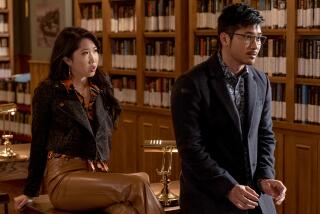Review: ‘11.22.63’ is a messy trip back in time to JFK’s assassination
Stephen King’s 2011 time-traveling historical romance thriller “11.22.63” has been made into a miniseries by Hulu. James Franco’s in it!
Franco plays Jake Epping, a 21st century high school teacher at loose ends: His wife is divorcing him, his father has died, and his students would rather look at their cellphones than watch him teach, even though he is James Franco.
One day, to put this as simply as possible, his friend Al (an excellent Chris Cooper) shows him the time tunnel he discovered in the pantry of his diner. It is a straight link to a certain day, minute and second in 1960 — the book reaches back further — and Al, who (a) has conceived a plan to stop Lee Harvey Oswald from killing John F. Kennedy and (b) is dying, wants Jake to finish the job for him. For a while, Jake sensibly regards this as insane, but he eventually gets way on board.
It’s a long book and a long miniseries, and while the adaptation follows the arc of the novel and maintains its big causes and big effects, it takes its own way from beginning to end, scanting much of what’s good about the novel and adding passages and plot lines that make it more like serial television.
Some of the changes are standard. Time is compressed, even at eight episodes, and while no wholly new characters are introduced, some are highly altered for dramatic convenience or are given new duties or motivations. There are always reasons for these things. “Adaptation” implies change. But there is more than one way to skim a book, and much of what feels complicated and lifelike in the book has been simplified and amplified for the screen.
Because Jake has years to wait for Oswald (Daniel Webber) to get busy, for much of its length, the novel takes up other business. Jake becomes a well-regarded small-town high-school teacher, invested in his students and in love with librarian Sadie Dunhill (Sarah Gadon). There is something perfunctory and insubstantial about these scenes, which are laden with leaden dialogue (“I don’t know a lot about you — what’s your middle name?” and “Sometimes people hide things inside because they’re afraid”).
That the miniseries strains to develop a fully rounded character over eight episodes is something of a surprise, given that show runner Bridget Carpenter is a veteran of “Parenthood” and “Friday Night Lights,” two shows that did that especially well.
Although there are some speeches written to echo Jake’s musings on mortality and chance and coincidence, the thriller takes precedence here. The novel does supply some of this action, but new passages have been written in, some more successful than others. Those involving Josh Duhamel as a bullying butcher are effective. (A truckload of profanity has also been shoveled into the dialogue, to ramp up the tension, I suppose.) There is some Hitchcock in the climax, before the story flips into “Doctor Who” mode, then downshifts to a sentimental coda.
Franco, whose goal in life seems to be to do one of everything, crosses “novel-adapting miniseries” off his list. (He directed an episode as well.) He’s quite all right, if perhaps a shade too serious for the material.
Though it includes scenes shot on location in Dallas’ Dealey Plaza, the production has the homely feel of an old-fashioned network TV movie rather than the new-fangled “cinematic” cable-style fare the streaming networks have typically aspired to. Still, if it never rises above the artificial, it is not entirely without entertainment value — artificiality itself has its pleasures. It may not be worth the price of the subscription, if you don’t already have one, but that is a decision you will have to make for yourself, viewer.
More to Read
The biggest entertainment stories
Get our big stories about Hollywood, film, television, music, arts, culture and more right in your inbox as soon as they publish.
You may occasionally receive promotional content from the Los Angeles Times.











